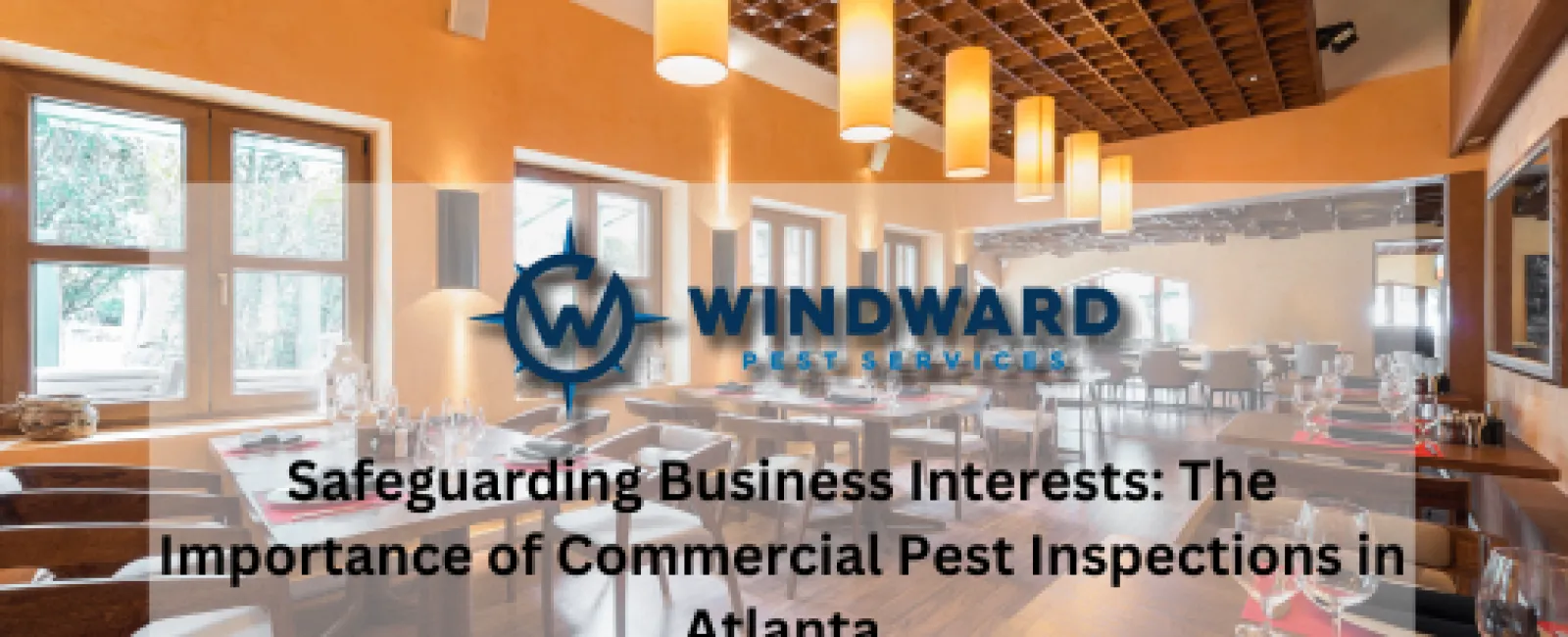In the vibrant and competitive business landscape of Atlanta, maintaining a pest-free environment is crucial for businesses across various industries. From restaurants and hotels to retail stores and office buildings, pest infestations can not only damage property but also tarnish brand reputation and compromise customer satisfaction. In this comprehensive guide, we'll explore the significance of regular commercial pest inspections in Atlanta and delve into the key considerations, benefits, and best practices for effective pest control in business settings.
Understanding Commercial Pest Control
- Commercial pest control involves the management and prevention of pest infestations in business establishments. In Atlanta, where the warm climate and urban environment create favorable conditions for pests, commercial properties are particularly susceptible to infestations. Common pests found in commercial settings include cockroaches, rodents, ants, and flies, all of which can pose significant health risks and economic burdens for businesses. Certified pest management professionals play a crucial role in identifying pest threats, implementing tailored treatment plans, and providing ongoing monitoring and prevention services to businesses in Atlanta.
Benefits of Regular Pest Inspections for Businesses
- Regular pest inspections offer numerous advantages for businesses in Atlanta. By detecting pest issues early on, businesses can prevent infestations from taking hold and mitigate the risk of property damage, product contamination, and health hazards. Moreover, regular inspections help protect brand reputation and customer satisfaction by ensuring a clean and pest-free environment. Compliance with health and safety regulations is another critical benefit of regular pest inspections, helping businesses avoid costly fines and legal liabilities. Ultimately, investing in regular pest inspections demonstrates a commitment to maintaining a safe and hygienic environment for employees and customers, which is essential for long-term success in Atlanta's competitive business landscape.
Key Considerations for Businesses Regarding Pest Inspections
- Several key factors must be considered when planning pest inspections for businesses in Atlanta. The frequency of inspections may vary depending on the type of business and its susceptibility to pest infestations. For example, restaurants and food service establishments may require more frequent inspections due to the presence of food sources that attract pests. Location and industry regulations also play a significant role in determining the need for pest inspections, with businesses located in urban areas or near bodies of water facing higher pest pressure. Hiring certified and experienced pest control professionals is essential for accurate inspections and effective treatment, ensuring that businesses receive the highest level of service and protection against pests.
Case Studies and Success Stories
- Numerous businesses in Atlanta have benefited from regular pest inspections and proactive pest management strategies. For example, a popular restaurant in downtown Atlanta maintained a pest-free kitchen and dining area by implementing regular inspections and sanitation protocols. As a result, the restaurant maintained its excellent reputation for cleanliness and food safety, attracting loyal customers and positive reviews. Similarly, a boutique hotel in Midtown Atlanta invested in regular pest inspections and preventive treatments to safeguard its guest rooms and common areas from pest infestations. The proactive approach to pest control helped the hotel maintain high occupancy rates and positive guest experiences, contributing to its success in Atlanta's competitive hospitality industry.
Best Practices for Businesses in Implementing Pest Control Measures
- To effectively manage pest risks, businesses in Atlanta should adopt best practices for implementing pest control measures. Establishing a proactive pest management plan is the first step, involving regular inspections, sanitation protocols, and employee training on pest awareness and reporting procedures. Conducting thorough inspections of all areas susceptible to pest activity, including kitchens, storage areas, and entry points, is essential for identifying pest threats and implementing targeted treatments. Additionally, integrating pest management strategies into overall business operations ensures that pest control measures are prioritized and effectively implemented across all areas of the business.
Importance of Pest Product Safety in Atlanta Businesses
- When implementing pest control measures in Atlanta businesses, it's crucial to prioritize the safety of pest control products. Using safe and approved pest control products helps minimize health risks to employees, customers, and the environment. Businesses should work with pest management professionals who prioritize the use of eco-friendly and low-toxicity products that are safe for use in commercial settings. Additionally, businesses should ensure proper storage, handling, and disposal of pest control products to prevent accidents and environmental contamination. By prioritizing pest product safety, businesses can effectively manage pest risks while maintaining a safe and healthy environment for all stakeholders.
The Role of Technology in Commercial Pest Control
- Advancements in technology have transformed the landscape of commercial pest control, offering innovative solutions for businesses in Atlanta. From remote monitoring systems to digital reporting platforms, technology enables businesses to track pest activity in real-time, streamline communication with pest management professionals, and access comprehensive data for informed decision-making. For example, smart pest traps equipped with sensors can detect pest activity and send alerts to businesses and pest control providers, allowing for rapid response and targeted treatments. By leveraging technology, businesses can enhance the effectiveness and efficiency of their pest control efforts, ultimately safeguarding their interests and ensuring a pest-free environment for employees and customers.
Community Collaboration in Pest Management
- In Atlanta's vibrant business ecosystem, collaboration extends beyond the confines of individual enterprises. Community engagement plays a pivotal role in fostering effective pest management practices across the city. By forging partnerships with local residents, government agencies, and academic institutions, businesses can leverage collective expertise and resources to address pest challenges on a broader scale.
- Community involvement in pest management initiatives can take various forms, from educational outreach programs to collaborative pest control efforts. Businesses can organize workshops and seminars to educate residents about pest prevention strategies and promote responsible pest management practices. By empowering community members with knowledge and tools to address pest issues proactively, businesses can create a culture of shared responsibility and cooperation in combating pests.
- Furthermore, businesses can collaborate with local government agencies to coordinate pest control efforts and share information about pest hotspots and emerging threats. By partnering with municipal authorities, businesses can gain access to valuable resources and support, such as pest surveillance data and pest control services. This collaborative approach ensures a more comprehensive and coordinated response to pest issues, benefiting both businesses and the community at large.
- Academic institutions also play a vital role in advancing pest management research and innovation. By partnering with universities and research institutions, businesses can participate in collaborative research projects aimed at developing novel pest control technologies and strategies. These partnerships facilitate knowledge exchange and technological advancements that can enhance the effectiveness and sustainability of pest management practices in Atlanta.
- Ultimately, community collaboration in pest management fosters a sense of collective ownership and accountability for maintaining a pest-free environment. By working together, businesses, residents, and stakeholders can create a healthier and more resilient community where pests pose less of a threat to public health, safety, and prosperity.
Commercial pest inspections are a critical component of pest control efforts for businesses in Atlanta. By investing in regular inspections and proactive pest management strategies, businesses can protect their property, brand reputation, and bottom line from the risks associated with pest infestations. From restaurants and hotels to retail stores and office buildings, maintaining a pest-free environment is essential for success in Atlanta's competitive business landscape. By prioritizing pest control measures and working with certified pest management professionals, businesses can ensure a safe, healthy, and pest-free environment for employees and customers alike, driving long-term growth and success.

